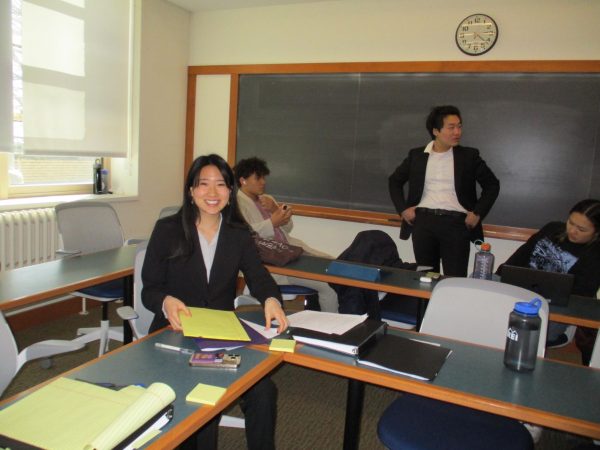
The Facilitators for Allocating Student Taxes (FAST) 2024–25 budget, which funds registered student organizations (RSOs), is approximately two-thirds of the previous year’s budget, which has resulted in smaller annual and supplemental budgets for some RSOs.
FAST is the student-run body that allocates funding to RSOs for programming and activities that serve the College community, per its constitution. Its five salaried student members — Jezebiel Gonzalez ’26, Akiko Jindo ’25, Palvasha Khan ’25, Andrew Oh ’25, and Osegie Osayimwen ’27 — were elected last spring.
[Editor’s note: Palvasha Khan ’25, executive editor-at-large, was not involved in the writing or editing of this article.]
FAST announced to the student body in an email on Sept. 24 that its annual budget is $463,980.29, marking a 31 percent decrease from last year’s allocation of $679,434.48.
FAST’s budget consists of funds from the annual student activity tax included in the comprehensive fee and surplus money carried over from the previous year. In a joint statement to the Record, the five members of FAST attributed the decline in total funds to the difference in surplus money from the previous year, which they described as “devastating towards FAST’s operation.”
“Rollover should technically not exist and is just a bonus if the previous year’s FAST board does not spend all of the given allocation,” they wrote. “If FAST spends all of the allocation this year (which we will most likely need to), it would mean next year the total allocation for FAST will barely be over $300,000, because there would be no rollover from this year.”
At the beginning of the academic year, RSOs with fixed anticipated costs — such as registration fees for competitive teams — submit an annual budget in which they outline costs for the year, and if FAST approves the budget, the groups receive their funds at the beginning of the academic year. After FAST allocates all annual budgets, it distributes its remaining funds on a case-by-case basis through supplemental budgets.
FAST distributed $213,244.48 to RSOs for the fall 2023 semester alone, according to an email from FAST to students in September 2023. This year, the budget permits only $169,078.82 in supplemental budgets for the entire fiscal year.
Several RSOs received less funding through their annual budgets than they did last year, according to the email FAST sent in September. The Williams College Ephlats, for instance, received $1,417.72 in 2023 but has been allocated only $949 this year. In 2023, the Williams Climbing Club received $2,570, while they have received $1,537.98 this year.
“We take no pleasure in having to restrict student activities due to limited funds, and this year, we’ve been forced to make difficult decisions so students have funds for the rest of the year,” the members of FAST wrote to the Record. “These difficult decisions have also taken a toll on the members of FAST. We’ve seen a lot of student groups coming to Office Hours to express their concerns about the funding available — the unfortunate reality is we don’t have much to tell them beyond ‘There are not enough funds.’”
The College has not increased the student activity tax in several years. Darren Guo ’27, treasurer of the College’s mock trial team, said rising prices due to inflation have increased the group’s expenses. “Hotels are pretty expensive — same for food, honestly — and [FAST’s] guidelines for hotels and food have basically stayed the same,” he said.
Some groups’ budgets, however, have grown over the last year. Williams Ski Patrol’s 2023–24 budget increased from $2,961.95 in 2023 to $7,364 this year, for example. The Black Student Union’s annual budget increased from $3,425 to $5,475.
This year, FAST also delayed its allocation of supplemental budgets. In an email to students on Sept. 17, FAST cited the transition to Workday as the reason for supplemental budget delays. The Workday transition — which impacted hiring and payment for student employees and hindered the hiring process for new OCL employees — delayed FAST’s ability to complete prior reimbursements, which in turn delayed its distribution of supplemental budgets, FAST wrote to the Record.
Cap & Bells, which historically has not submitted an annual budget because its costs vary greatly by semester, still had not received approval for supplemental budget items as of yesterday, treasurer Garrett Makosky ’26 said. Cap & Bells will host a play festival in less than a month, but the budget uncertainty is hindering the production process, he added.
“Designers are not able to do their jobs because we just simply do not know how much money we have,” he said. “We’re kind of at a standstill.”
The members of FAST wrote that they felt “overwhelmed” by the changes it experienced over the last year. “We do not have the same level of institutional knowledge nor guidance to be able to carry out our work adequately,” they wrote.
Leaders of RSOs have also noted that staffing changes at OCL — particularly the departure of former Assistant Director for Student Involvement Mike Bodnarik and former Financial and Administrative Coordinator Ivy Campos last year — have hampered communication between campus offices and student groups as they’ve struggled with diminished funds.
“I spent a lot of time in Mike Bodnarik’s office last year,” Makosky said. “He was a really important connection between Cap & Bells, OCL, the administration, and FAST, and once that line of communication dissipated, it’s been really hard to mend. I feel like a lot of the institutional support isn’t quite there.”















